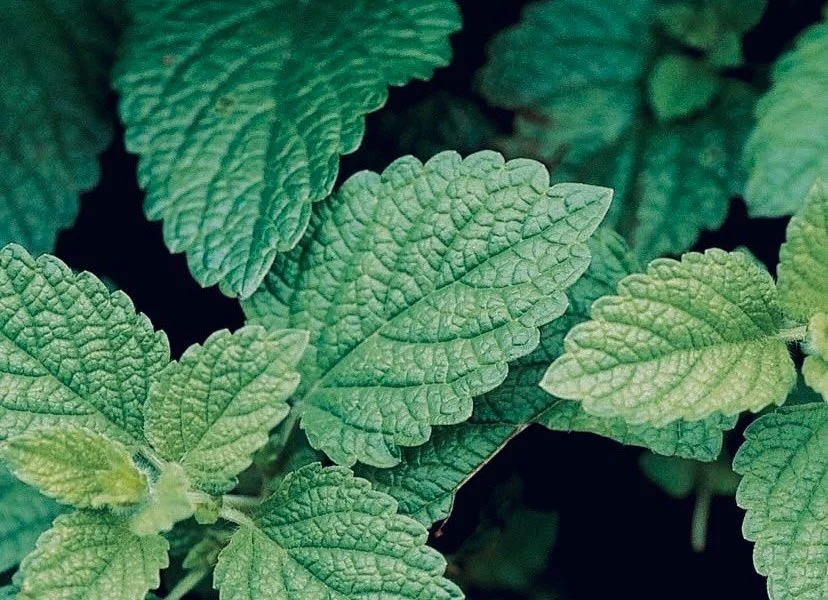MELISSA OFFICINALIS HERBAL MONOGRAPH
Botanical Name: Melissa officinalis.
Common Name: Lemon Balm.
Family: Lamiaceae.
Description: A perennial herb in the Mint (Lamiaceae) family, which grows from 40cm to 1 metre tall. Square stems, with green oval or heart shaped leaves with scalloped edges which have a lemon scent. White, pale yellow or pale pink flowers appear in whorls at the tops of the stems. Native to southern Europe, Lemon Balm is now naturalised worldwide.
Parts Used: Leaves.
Energetics: Cooling & moistening.
Taste: Sweet, slightly minty.
Actions: Carminative, mild anti-depressant, antispasmodic, diaphoretic (a relaxing diaphoretic as opposed to a stimulating diaphoretic), antiviral, antioxidant, aromatic, nervine, mild sedative, neuroprotective.
Folklore & Traditions: Native to Southern Europe, by the Middle Ages Melissa officinalis was cultivated throughout all of Europe, utilised for it’s ability to reduce stress and anxiety, promote sleep, improve appetite, and ease pain and discomfort from indigestion. The name ‘Melissa’ comes from the Greek word for honeybee. Throughout history, beekeepers have planted Lemon Balm around their hives, believing its scent helped calm bees and prevent swarming. The Swiss physician and Alchemist, Paracelsus (1493-1541) believed that Lemon Balm was an “elixir of life” as it increases strength and lengthens life. Lemon Balm was considered sacred in the temple of the ancient Roman goddess Diana.
Constituents: Flavinoids (including quercetin, isoquercetin & luteolin), rosmarinic acid, ferulic acid, caffeic acid, methyl carnosoate, hydroxycinnamic acid.
Medicinal Uses: Ease insomnia & promote restful sleep: A common herbal remedy for insomnia, nervousness and anxiety. Lemon Balm is a calming and soothing nervine useful to support relaxation, reduce anxiety, and promote restful sleep.
Balance emotions: As a nurturing, soothing and uplifting nervine and mild anti-depressant, Melissa officinalis is a common herbal remedy for shock, stress & anxiety, melancholy and tension headaches. Relaxes the central nervous system, gently easing nervous tension and bringing mental calm and clarity. Lemon Balm is a mild sedative, without causing drowsiness. Beneficial to reduce stress and improve cognitive performance, and to uplift the spirits. For headaches and migraines, it’s vasodilation (dilate blood vessels) properties relieve tension. Soothing and nourishing for people with Alzheimer’s disease, Dementia and attention deficit/hyperactivity disorders (ADD/ADHD).
Improve digestion: Traditionally used for digestive support, Lemon Balm is a soothing carminative which relaxes digestive spasms, improves circulation and relieves gas and bloating. Beneficial for improving appetite & relieving indigestion. Nervous disorders that affect the stomach benefit from Lemon Balm as it stimulates digestion and acts as an antispasmodic, reducing voluntary and involuntary muscle spasms.
Antiviral & antioxidant benefits: Lemon Balm is known for it’s powerful anti-viral properties, as it destroys or suppresses growth of viruses, generally by supporting the immune system. antiviral properties, particularly against the herpes simplex virus - Lemon Balm is known for its ability to help heal cold sores and herpes. As an antioxidant, Lemon Balm prevents free radical (oxidative) damage to cells.
Reduce fever: A classic remedy for high fevers, Lemon Balm is a diaphoretic which allows the body to cool, relax nervous tension and improve circulation allowing release of trapped body heat.
Other conditions that Lemon Balm is useful for include asthma, vertigo, menstrual pains, hypertension, gout, insect bites and skin infections.
Chakra: Heart
Astrological Correspondence: Jupiter, Ceres and the Moon.
Cautions & Contraindications: Lemon Balm is generally safe and tolerated by all ages, Contraindicated in people with hypothyroidism.
SHOP ANTI-ANXIETY TEA WITH LEMON BALM HERE.
SHOP SWEET DREAM TEA WITH LEMON BALM HERE.
References: Apelian, N. & Davis, C. The Lost Book Of Herbal Remedies, 2019.
Ayales, Adriana. The Herbal Astrology Oracle. Hay House, 2022.
Gladstar, Rosemary. Medicinal Herbs: A Beginner’s Guide. Storey Publishing, 2012.
Hardin, J & Rose, K. Materia Medica : Profiles & Uses of Herbs, 2016.
https://www.herbrally.com/monographs/lemon-balm
Tierra, Michael. The Way of Herbs, 1998.
